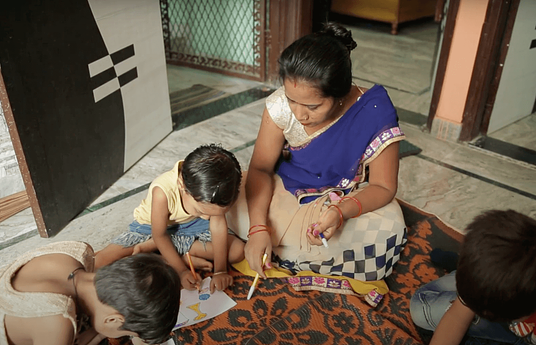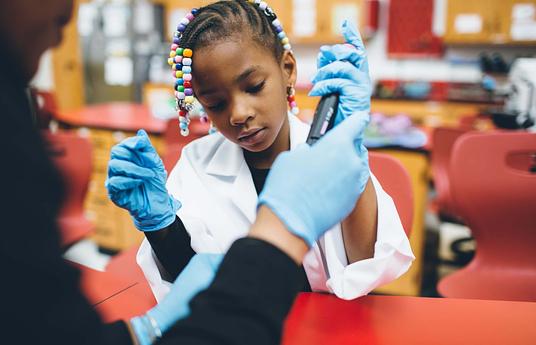“We’ve been discussing a lot about whole-school models and making every school a good one, but to make education change a reality, it needs to happen in every country, in every city, in every school.”
During the 2018 HundrED Innovation Summit, we heard from Pia Pakarinen, Deputy Mayor of Education in Helsinki, Vanessa Wilkins, founder of Future School Lab, and Whitney Grubbs, director of the Chalkboard Project, who collectively spoke about the need for collective transformation across all levels of intervention in our schools.
Education, as a system, has always presented a unique opportunity to level the playing field, to help every child to succeed in whatever is their given talent and dream. However, our schools have become increasingly disconnected from the world in which they are preparing today’s children for. Students are becoming apathetic, teachers are overworked, parents are frustrated and the communities are just not thriving.
In an interview with HundrED, Anthony Mackay, CEO and President of the Washington DC-based National Center on Education and the Economy expressed that "Learning is a shared responsibility. Whilst the teaching profession is vital and should continue to provide leadership, we are increasingly thinking about how we partner and collaborate with others in order to ensure that every young person can learn in powerful and continuous ways."
Inspired by such conversations, the United Nations Sustainable Development Goals and the need for our collective action, this month, we will be focusing on sharing innovations that are helping schools change and supporting systems to innovate and adapt for the benefit of our children. We understand solving the world's education crisis isn't a simple task. But we do believe that with every education stakeholder playing their part well, it is certainly possible.
Let Students Take The Lead
As global migration increases, communities around the world are becoming more diverse, though with increased diversity there has been a global increase in cultural conflict and misunderstanding. Though the youth of today are showing us how they fight rising xenophobia, discrimination, and violence by leading their own charges.
Peyton Klein founded the Global Minds Initiative in December of 2016, a for-youth, by-youth organization that inspires students of all backgrounds to develop intercultural friendships and explore global issues. Through youth-led extracurricular activities, the Global Minds Initiative combat issues of cultural intolerance, ignorance, and discrimination, currently impacting 1500 students across 22 schools in the USA and Canada.
Miles away, gold Youth Development Agency has worked with over 7000 youth from Africa enabling and empowering them to take their community's future in their own hands. With an audacious goal of developing 10 million young African leaders with strong character & integrity, the innovation is embedding the format of long-term peer leaders and mentors into schools and communities that mobilise the students with the knowledge, tools, and support to reach their full potential.
In India, Reap Benefit is building a tribe of problem-solving citizens who drive change in their local communities by solving everyday issues using local data, local solutions and local campaigns. They have activated 33000+ young people who have taken 60,000 civic actions in their communities that include reporting issues to local governance, initiating community campaigns and have built 300+ civic innovations that solve local problems in waste, water, sanitation and pollution.
Innovations like Global Minds Initiative, gold Youth Development Agency & Reap Benefit are just a glimpse into what is possible when we pass the leadership baton to our students.
Inspired Teachers Inspire Students
In environments where student leadership is still not encouraged, teachers have the potential to change the narrative. Inspired teachers are more engaged, better planned and have higher job satisfaction. Just like The Teachers Guild, we believe "our teachers are the innovators education has been waiting for. But not just that, they are the makers, the activists, and the civic leaders education has been waiting for."
Having worked with over 100,000 teachers across the USA, The Teachers Guild empowers Teachers to use Design Thinking methods and mindsets in their professional lives. They are focused on catalysing creative leadership and use a learner-centered approach to problem-solving that builds teachers' skills and confidence to design for the evolving needs of their students and schools.
Edcamp movement is disrupting traditional PD with participant-driven, collaborative conversations by teachers, for teachers. Edcamps are free and open to anyone, organized by volunteers, usually full-time teachers. Edcamps are also a proof of solid teacher intention and leadership as it has spread to 33 countries around the world with over 2,500 Edcamps having been held since 2010.
Far away in Kenya, Dignitas Project has spent over a decade equipping educators as agents of transformation so that every child reaches their potential. Dignitas uses an innovative training and coaching approach to empower schools and educators to transform students’ opportunities with high-quality teaching and learning. Their use of Leadership Academies, Professional Development Workshops, Coaching, and Professional Learning Communities have helped 53,000 teachers from Kenya and South Sudan.
A similar program, STiR Education from India is committed to reigniting intrinsic motivation in teachers and education systems. In 2019 STiR Education impacted more than 200,000 teachers and 6 million children across 4 Indian states and one-quarter of all districts in Uganda. They believe it is a moral and economic imperative that every child, everywhere, has a teacher who cultivates the joy of lifelong learning.. and so do we.
The Key To A School's Success: School Leaders Matter
A sure way to engage the larger school community is to encourage and enable the school leader community. Often forgotten, school leaders aren't given the love and attention they deserve.
Global School Leaders (GSL) view school leaders as change agents that greatly influence the outcomes of students. They believe principals and their leadership teams are key to supporting teacher development and setting the conditions for a positive learning environment, therefore, supplementing student learning and growth. Providing professional development to school leaders serving the neediest students in India, Malaysia, Indonesia, and Kenya, GSL blends on-site coaching, participatory workshops, and peer exchanges to transform the focus of school leaders from administration to improving their own and student’ learning.
Shadow a Student is a different yet innovative idea to help school leaders take the time to build student empathy, especially for those students who may be at the margins, and translate insights gained into immediate action. The Shadow a Student Challenge is an initiative of School Retool. Coming out of IDEO and the Hasso Plattner Institute of Design at Stanford University, with support from the William and Flora Hewlett Foundation, School Retool is a professional development fellowship that helps school leaders redesign their school cultures using small, scrappy experiments called “hacks.”. Over 1,800 school principals from 50 states and 61 countries signed up to shadow in 2017, making it a simple way to support school leaders worldwide!
Home Is Where Learning Begins, So Why Leave The Parents & Communities Out?
As students step out of their schools and classrooms, their learning journeys continue to unfold. Engagement with parents, friends, local communities - all continues to play a vital role in how our children are educated.
ANEER program from Morocco is an innovative model of community pre-schooling whose purpose is to impact the entire environment of children from school implementation to parental education. Having impacted over 11000 children, the model aims to create the most favorable conditions for a successful education through the implementation of projects for parents, youth, local associations/NGOs/champions and local teachers. Mothers attending their training sessions focus on child development, stimulation techniques, hygiene rules in order to allow them to pursue activities and learning plays with their children at home. The participatory approach makes the mothers more sensitive to their children's schooling and what it implies from them in terms of guidance throughout the years.
Dost Education empowers aspiring middle-income parents in India to improve their child’s early development and school success. Through widely available mobile technology, Dost, which means “friend” in Hindi, delivers local language curriculum and a communication platform to arm parents with the knowledge and resources they crave.
Without Collaboration and Collective Action, It Will Take Too Long
Finally, to really close the education gap, we need to work together. We need to engage communities, technology, resources and leadership to reach to ALL students and help them flourish.
Since 2007, Remake Learning members have been working together to ignite more engaging, relevant, and equitable learning opportunities for young people navigating rapid social and technological changes. Remake Learning is a regional learning network involving more than 500 organizations, including more than 130 school districts, more than 80 out-of-school learning providers, and more than 30 universities, all working together to ignite engaging, relevant, and equitable learning opportunities for young people.
Another example is that of The Clubhouse Network, a safe out-of-school learning environment where young people from underserved communities work with adult mentors. The Clubhouse Network is an international community of more than 100 Clubhouses located in 19 countries, providing youth with life-changing opportunities for now over 25 years. Having worked with over 25000 young people from 19 countries, their approach is designed to empower youth from all backgrounds to become more capable, creative, and confident learners.
Slightly different but highly relevant, Smart School Alliance is answering the question - How can children in small and remote schools be given access to a new generation of education?
Smart School Alliance, founded by the Ministry of Economic Affairs and executed by the Innovation Learning Center, Digital Education Institute and Institute for Information Industry in Taiwan, consists of many small schools that become part of one big online and offline (O&O) school. The aim is to let students study locally but learn globally. The Alliance has worked with 40,000 students and teachers, creating equal learning rights for the next generation in small and remote schools around the world.
I-Chang Tsai, Vice President and Director General, Digital Education Institute shares that the “Smart School Alliance brings the 'sharing economy' philosophy to education. Even students in the most remote villages have the same learning opportunities as those in the cities."
**
Given the complexity of the global education landscape, solving the education crisis requires an all-hands-on-deck approach. We can not leave an education stakeholder behind. But then,
"Never doubt that a small group of thoughtful, committed citizens can change the world; indeed, it's the only thing that ever has." - Margaret Mead
To receive articles directly in your inbox featuring our leading K12 innovations, subscribe to our newsletter now!




